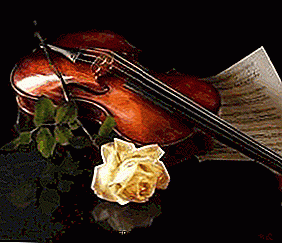
So, in the center of our attention today - the most famous classical musical works. For several centuries classical music has been stirring its listeners, evoking in them storms of feelings and emotions. It has long become a part of history and thin threads intertwined with the present.
Undoubtedly, in the distant future, classical music will be no less in demand, since such a phenomenon in the music world cannot lose its relevance and significance.
Name any classic piece - it will be worthy of the first place in any music charts. But since the most famous classical musical works cannot be compared with each other, due to their artistic uniqueness, the opuses mentioned here are presented only as works for reference.
"Moonlight Sonata"
Ludwig van Beethoven
In the summer of 1801, the brilliant work of L. B. Beethoven, who was destined to become famous around the world. The name of this work, "Moonlight Sonata", is known to absolutely everyone, from old to young.
But initially, the work had the title “Almost Fantasy”, which the author dedicated to his young student, the beloved Juliet Gvichchardi. And the name by which it is known to this day was invented by the music critic and poet Ludwig Relshtab after the death of L.V. Beethoven. This work belongs to one of the most famous musical works of the composer.
By the way, an excellent collection of classical music is the publication of the newspaper “Komsomolskaya Pravda” - compact booklets with discs for listening to music. You can read about the composer and listen to his music - very convenient! Recommend order CDs from classical music right from our page: press the “buy” button and immediately go to the store.
"Turkish March"
Wolfgang Amadeus Mozart
This work is the third part of the Sonata No. 11, it was born in 1783. Initially it was called the Turkish Rondo and was very popular among Austrian musicians, who later renamed it. The name "Turkish March" was fixed for the piece also because it is consonant with the Turkish janissary orchestras, for which the sound of drums is very characteristic, which can be traced in the "Turkish March" V.A. Mozart
"Ave Maria"
Franz Schubert
The composer himself wrote this work to the poem "The Virgin of the Lake" by W. Scott, or rather to her passage, and did not intend to write such a deeply religious composition for the Church. Some time after the appearance of the work, an unknown musician, inspired by the prayer "Ave Maria", put her lyrics to the music of the brilliant F. Schubert.
"Fantasy-impromptu"
Frederic Chopin
This work of F. Chopin, the genius of the period of romanticism, dedicated to his friend. And it was he, Julian Fontana, disobeying the instructions of the author, published it in 1855, six years after the composer's death. F. Chopin believed that his work was similar to the impromptu I. Moscheles, Beethoven's disciple, a famous composer and pianist, which was the reason for the refusal of the release of Fantasy-Impromptu. However, this brilliant work no one ever considered plagiarism, except the author himself.
"Flight of the Bumblebee"
Nikolai Rimsky-Korsakov
The composer of this work was a fan of Russian folklore - he was interested in fairy tales. This led to the creation of the opera "The Tale of Tsar Saltan" on the plot by A.S. Pushkin. Part of this opera is the interlude "Flight of the Bumblebee". Masterly, incredibly vividly and ingeniously imitated in the work the sounds of the flight of this insect N.A. Rimsky-Korsakov.
"Caprice number 24"
Niccolo Paganini
Initially, the author composed all his caprices solely for the purpose of perfecting and honing the skill of playing the violin. Ultimately, they brought a lot of new and unknown things to the violin music. And the 24th Caprice, the last of the caprices of N. Paganini, bears in itself a swift tarantella with folk intonations, and is also recognized as one of the works ever created for the violin, which have no equal complexity.
"Vocalise, opus 34, №14"
Sergei Vasilyevich Rahmaninov
The composition ends with the 34th opus of the composer, which combines fourteen songs written for voice with piano accompaniment. Vocalise, as it should be, does not contain words, but is performed on one vowel sound. S.V. Rachmaninov dedicated it to Antonina Nezhdanova, an opera singer. Very often this work is performed on a violin or cello accompanied by piano accompaniment.
"Moonlight"
Claude Debussy
This work was written by the composer under the impression of the lines of the poem by the French poet Paul Verlaine. The name very clearly conveys the softness and touchingness of the melody, which affects the soul of the listener. In 120 films of different generations this popular work of the brilliant composer K. Debussy sounds.
As always, the best music is in our group in contact: //vk.com/muz_class - Join yourself and invite your friends! Enjoy the music, do not forget to like and leave comments!
The most famous classical pieces of music listed above are certainly not all worthy of the creation of the greatest composers of different times. You, probably, understand that the list is simply unstoppable. Not named, for example, Russian operas or German symphonies. So what to do? We invite you to share in the comments about the work of classical music, which once impressed you greatly.
The author - Stanislav Kolesnik
And at the end of the article I suggest listening to Claude Debussy's wonderful work “Moonlight” performed by the Cherkasy Chamber Orchestra:

Leave Your Comment